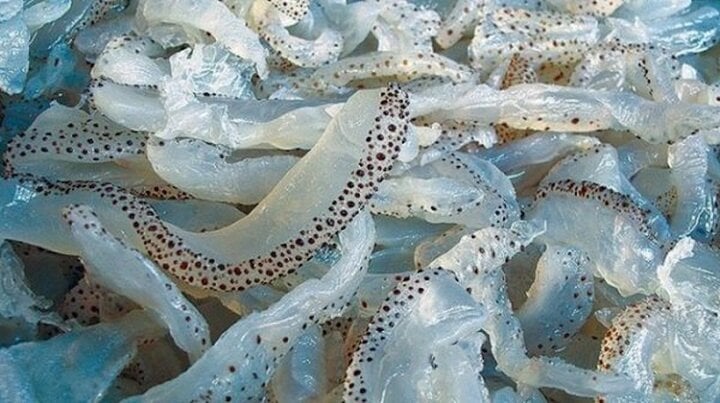Jellyfish is a soft-bodied mollusk, a rich food source from the sea, easy to process into delicious dishes that many people love.
Jellyfish are abundant in Vietnam and have high nutritional value. 100g of jellyfish contains 12.3g of protein, 0.1g of fat, 3.9g of sugar, 182mg of calcium, 9.5mg of iron, and 132mg of iodine.
Jellyfish is rich in protein and antioxidants, especially containing omega 3 and omega 6, polyphenols, which help reduce the risk of cardiovascular disease. In particular, polyphenols have the effect of promoting brain function, preventing some chronic diseases including cardiovascular disease, type 2 diabetes and cancer.
Notes when eating jellyfish
There are many different types of jellyfish, but not all of them are edible. Jellyfish used as food are not poisonous. However, if not processed properly, jellyfish will cause poisoning to the user. The eating process also needs attention because it can cause allergies, anaphylactic shock affecting health.
If you have never eaten jellyfish before, you should only eat a small amount at first, and only eat more if you do not see any reaction to avoid the possibility of an allergic reaction. When eating, you need to ensure food safety rules, only eat properly processed jellyfish, do not eat fresh sea jellyfish.

Jellyfish is delicious but children under 8 years old should not eat it.
To ensure public health and prevent summer food poisoning caused by jellyfish, the Food Safety Department recommends that people do not use fresh (unprocessed) jellyfish as food, make raw salads, and especially do not use jellyfish (including processed jellyfish) as food for children. Only use properly processed jellyfish.
Fresh jellyfish must be soaked three times in salt water and alum. Only when the jellyfish meat turns light red or light yellow can it be used for food processing.
Do not eat too much jellyfish to avoid the risk of excess aluminum in the body, because when preparing jellyfish, many people can use alum to soak. This is a chemical compound commonly known as aluminum potassium sulfate, sometimes used as an additive to preserve food.
Although allowed to be used in food, eating too much aluminum can lead to Alzheimer's disease and inflammatory bowel disease.
Who should not eat jellyfish?
Although jellyfish is a nutritious, cool, and healthy dish, the following groups of people need to be careful when eating even processed or cooked jellyfish, specifically:
- People with a history of seafood allergies
- People who have just recovered from illness
- People with physical weakness
- People with a history of previous food poisoning.
In particular, children under 8 years old should not eat jellyfish because their immune systems are weak and the risk of allergies or food poisoning is also higher.
Source























































![[Maritime News] Two Evergreen ships in a row: More than 50 containers fell into the sea](https://vphoto.vietnam.vn/thumb/402x226/vietnam/resource/IMAGE/2025/8/4/7c4aab5ced9d4b0e893092ffc2be8327)












































Comment (0)